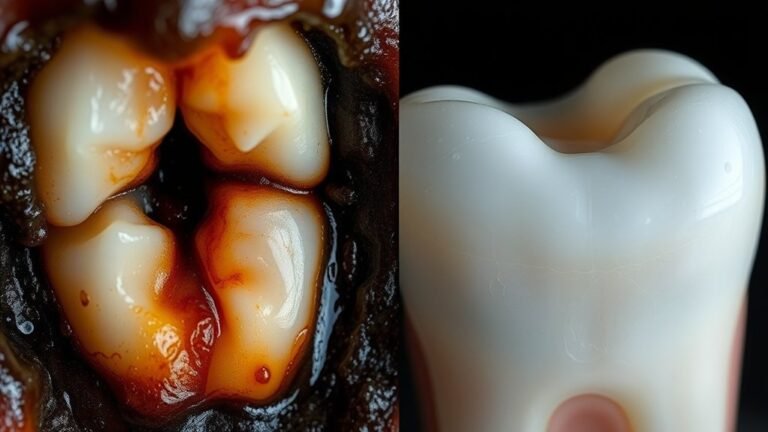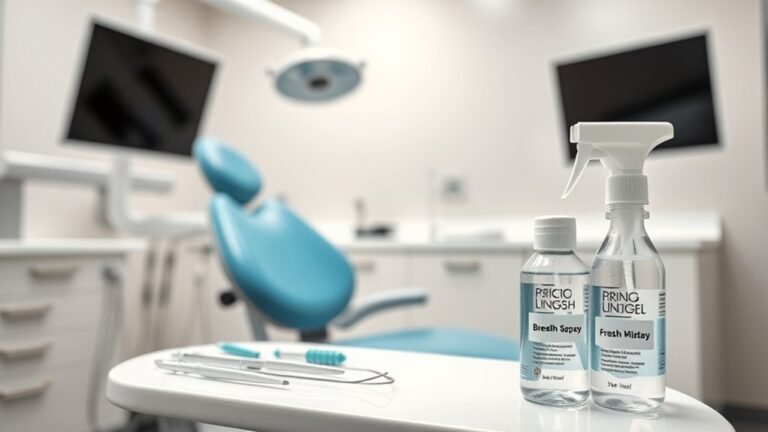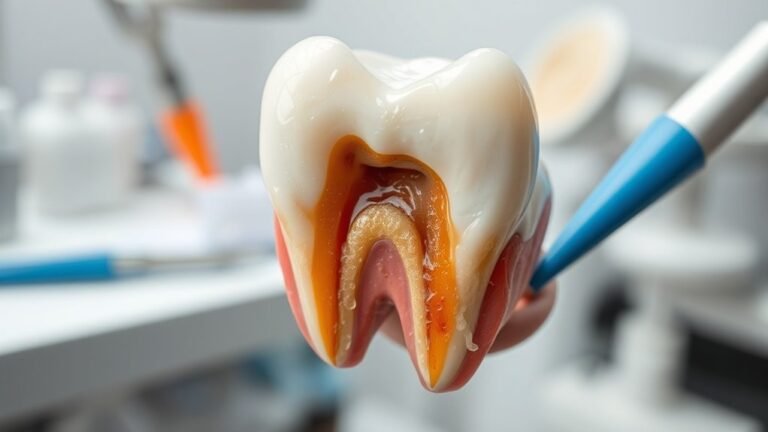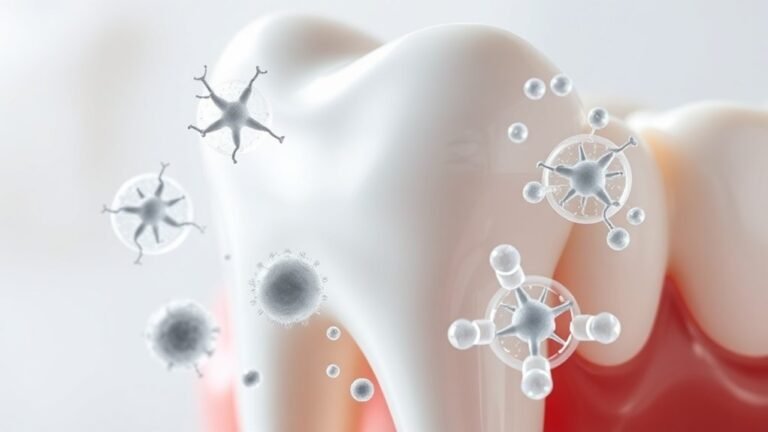Sugar-Rich Diets Disrupt the Oral Microbiome Leading to Infections and Decay
A sugar-rich diet disrupts your oral microbiome by promoting the growth of harmful bacteria. These bacteria thrive on sugar, producing acids that erode your tooth enamel and lead to decay. As harmful bacteria proliferate, they form resilient biofilms, complicating oral health. This imbalance can trigger infections and even gum disease. By understanding these connections, you can better protect your dental health and discover effective ways to maintain a balanced microbiome for a healthier smile.
Key Takeaways
- Sugar-rich diets promote harmful bacteria growth, disrupting the oral microbiome balance essential for dental health.
- Harmful bacteria metabolize sugar, producing acids that erode tooth enamel and lead to decay.
- Sticky biofilms formed by sugar-loving bacteria make teeth vulnerable to infections and decay.
- An imbalanced microbiome can trigger gum disease, bad breath, and systemic health issues due to pathogenic bacteria overgrowth.
- Moderating sugar intake and maintaining rigorous oral hygiene are crucial for preventing infections and preserving dental health.
The Role of the Oral Microbiome in Dental Health
While many people focus on brushing and flossing to maintain dental health, the role of the oral microbiome is equally vital. Your mouth houses a complex ecosystem of bacteria that contributes to oral health. A sugar-rich diet can lead to oral microbiome disruption, promoting the growth of harmful bacteria. These bacteria produce acids that erode tooth enamel, ultimately resulting in dental decay. Research indicates that a balanced microbiome, rich in beneficial bacteria, helps inhibit the proliferation of these pathogens. By maintaining a healthy diet and minimizing sugar intake, you can support your oral microbiome, thereby reducing the risk of dental issues. Prioritizing this balance is imperative for long-term dental health, as it directly impacts the integrity of your teeth and gums.
How Sugar Fuels Harmful Bacteria
When you consume sugar, you’re not just satisfying your sweet tooth; you’re also creating an environment that promotes the growth of harmful bacteria in your mouth. These bacteria thrive on sugar, leading to increased acid production that can damage your enamel and contribute to cavities. Understanding this relationship is essential for maintaining your oral health and preventing dental issues.
Bacterial Growth Promotion
Sugar not only satisfies your sweet tooth but also creates an ideal environment for harmful bacteria in your mouth to thrive. When you consume sugar, it fuels the growth of bacteria that contribute to infections. These microorganisms form a sticky biofilm on your teeth, making it difficult for saliva and oral hygiene practices to remove them. As this biofilm matures, it becomes more resilient, allowing bacteria to flourish and create a habitat conducive to disease. The accumulation of sugar not only promotes bacterial growth but also enhances their ability to produce acids, which leads to further complications. By understanding how sugar fosters harmful bacteria, you can take steps to protect your oral health and reduce the risk of infections.
Acid Production Increase
The relationship between sugar consumption and harmful bacteria extends beyond mere growth; it directly influences acid production in the mouth. When you consume sugar, specific bacteria, such as Streptococcus mutans, metabolize it, resulting in lactic acid as a byproduct. This acid lowers the pH in your oral environment, creating a more acidic condition that enhances enamel demineralization. Research indicates that frequent sugar intake can lead to sustained acid exposure, increasing the risk of cavities and other dental issues. Additionally, the acidic environment favors pathogenic bacteria over beneficial ones, further disrupting your oral microbiome. Consequently, by fueling harmful bacteria, sugar doesn’t just promote their growth—it actively contributes to an environment conducive to decay and infection.
The Connection Between Sugar Consumption and Tooth Decay
While many enjoy sweet treats, it’s important to recognize how such indulgences can lead to tooth decay. When you consume sugar, harmful bacteria in your mouth metabolize it, producing acids as a byproduct. These acids erode tooth enamel, making your teeth vulnerable to decay. Studies show that frequent sugar consumption increases the risk of cavities, as the acidic environment disrupts the natural balance of oral bacteria. The longer sugar lingers in your mouth, the greater the damage, especially if oral hygiene is lacking. Additionally, sugary foods often stick to your teeth, prolonging exposure to harmful bacteria. To protect your dental health, consider moderating sugar intake and maintaining a rigorous oral care routine, ensuring a healthier smile for the long term.
Effects of an Imbalanced Microbiome
When the balance of your oral microbiome is disrupted, it can lead to a cascade of negative effects on both dental and overall health. An imbalanced microbiome often results in the overgrowth of harmful bacteria, which can cause gum disease, tooth decay, and bad breath. Research shows that these pathogenic bacteria can release toxins, triggering inflammation and systemic health issues, including cardiovascular disease and diabetes. Moreover, a disrupted microbiome can impair your immune response, making it harder for your body to fight off infections. This imbalance can also affect nutrient absorption, leading to deficiencies that impact your overall well-being. Maintaining a healthy microbiome is essential for preventing these complications and supporting both oral and systemic health.
Preventative Measures for Maintaining Oral Health
Maintaining oral health requires a proactive approach that prioritizes the balance of your oral microbiome. Regularly brushing your teeth with fluoride toothpaste and flossing helps remove plaque and prevent harmful bacteria from thriving. Incorporating antimicrobial mouthwash can further reduce pathogenic microbes, contributing to a healthier environment in your mouth. Additionally, consider scheduling professional dental cleanings at least twice a year; these appointments can help identify and mitigate potential issues early. Staying hydrated is also essential, as saliva plays a critical role in neutralizing acids and washing away food particles. Finally, managing stress through mindfulness techniques can positively influence your microbiome, as stress negatively affects oral health. By implementing these measures, you can maintain a balanced microbiome and promote overall oral health.
The Importance of Dietary Choices for a Healthy Smile
Your dietary choices play an essential role in shaping your oral health, as the foods you consume directly influence the composition of your oral microbiome. High-sugar diets promote harmful bacteria, leading to tooth decay and infections. Research shows that a balanced diet rich in fruits, vegetables, whole grains, and lean proteins supports beneficial bacteria, enhancing your oral ecosystem. Foods containing probiotics, like yogurt, can further boost oral health by balancing microbial populations. Furthermore, adequate hydration helps wash away food particles and bacteria, reducing decay risk. By consciously selecting nutrient-dense foods and limiting sugars and acidic beverages, you can foster a healthier microbiome, ultimately protecting your teeth and gums. Prioritizing your diet today leads to a brighter, healthier smile for years to come.
Frequently Asked Questions
Can Certain Foods Help Restore a Healthy Oral Microbiome?
Yes, certain foods can help restore a healthy oral microbiome. Incorporating probiotic-rich yogurt, fibrous fruits, and vegetables enhances beneficial bacteria. Additionally, green tea and nuts provide antioxidants that support overall oral health.
How Long Does It Take for Sugar Effects to Impact Dental Health?
The effects of sugar on dental health can become noticeable within just a few weeks. Frequent exposure can lead to enamel erosion, cavities, and gum disease, emphasizing the importance of moderation in your diet for oral health.
Are Sugar Substitutes Safer for Oral Health?
Yes, sugar substitutes are generally safer for oral health. They don’t promote tooth decay like sugars do, as they’re less fermentable by harmful bacteria, helping maintain a healthier oral microbiome and reducing the risk of cavities.
What Are the Signs of an Unhealthy Oral Microbiome?
You might notice bad breath, frequent cavities, or gum inflammation, which affect around 70% of adults at some point. These signs indicate an unhealthy oral microbiome, impacting both your dental health and overall well-being.
How Does Stress Affect Oral Microbiome Health?
Stress disrupts your oral microbiome by altering salivary flow and immune responses. This imbalance can lead to harmful bacteria overgrowth, increasing risks for gum disease, cavities, and other oral health issues you might experience.
Conclusion
Just as a garden flourishes with care and the right nutrients, your oral health thrives on balanced choices. When you indulge in sugar, you’re inviting weeds—harmful bacteria—that can choke out the good flora essential for a vibrant smile. By nurturing your diet and steering clear of excess sugar, you can cultivate a flourishing microbiome. Remember, the health of your mouth is a reflection of your choices; tend to it wisely, and it will reward you with a radiant, resilient smile.






